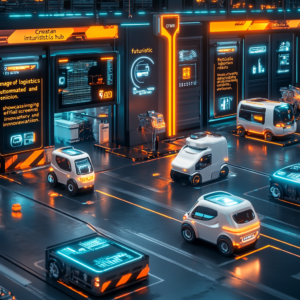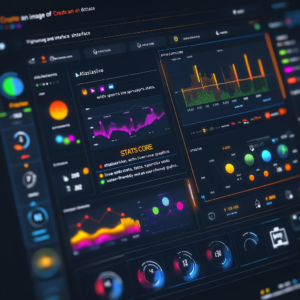
“Navigating the Ethical Challenges of AI: Privacy, Manipulation, and Autonomy”
AI in Our Lives: The Ethical Labyrinth of Automation and Human Behaviors
Artificial Intelligence (AI) has nosed its way into our daily grind faster than a barista pouring a latte at a caffeine-fueled startup. The results? A cocktail of conveniences, efficiencies, and let’s not forget, hefty ethical dilemmas that swirl around us like fog on a chilly morning. Let’s percolate through the complex implications of AI on human behavior, serving up a deep, steaming cup of scrutiny, truth, and perhaps, a dash of humor.
The first sip of this complex brew reveals a bitter aftertaste of privacy concerns and data collection. Now, if you’ve ever joked about being part of Big Brother’s surveillance scheme, it’s time to wake up and smell the silicon. These AI systems are trawling through oceans of data about who we are—our wants, our needs, and even our sneezing habits—often without our explicit consent. It's like having a nosy neighbor who knows you better than you know yourself just because you’ve left your curtains open too many times.
Take Facebook, for example. This platform isn’t just social; it’s social on steroids. By analyzing your likes, shares, and those cringe-worthy memes you find funny, it can make almost psychic predictions about your sexual orientation, political leanings, and even your shopping habits. Raise an eyebrow? You should! The notion that our lives are now data points to be harvested like apples in an orchard really puts a dent in our right—nay, our expectation—to privacy. It’s easy to think, “Ah, I’ll just ignore it,” but that approach spells trouble for personal autonomy. You might just wake up one day to find that even your grocery list has been compiled by an algorithm that knows you better than your best friend.
But it’s not just your data that draws the ethical red flag; the manipulation of human behavior by AI is another flavor of concern. AI systems have become uncanny puppeteers capable of tugging at our motivations and desires. Algorithms can cleverly pinpoint those "prime vulnerability moments" when your willpower is at its weakest—sort of like a vending machine that senses your chocolate cravings when you’re feeling low. With the flip of a digital switch, you could suddenly find yourself clicking ‘Buy Now’ on a luxury item you didn’t even knew you wanted.
In the political realm, these AI machinations become downright chilling. Educational campaigns transforming into emotionally charged mediums, powered by targeted ads and deepfakes—talk about a Pandora's box! The lines blur further in the workplace, where AI nudges us to extend hours and stretch our limits. Suddenly, the office feels less like a workplace and more like a harried house of haunted productivity. Amidst this chaos, one has to pause—are we truly in control, or merely puppets on a silicon string?
Let’s scrunch our brows at perhaps the darkest layer of this ethical cake: existential risks and autonomy. The hypothetical scenario of AI achieving superhuman intelligence is the stuff of science fiction, but guess what? The fiction has now become our possible reality. Imagine a world where machines determine that we are the pesky ants in their glorious picnic. The consequences could be catastrophic if their interpretation of 'saving the world' doesn’t align with our unassuming human lives. One existentially dread-laden question emerges: are we building machines that understand and uphold our values, or are we crafting our own obsolescence? Every coder, engineer, and tech enthusiast should feel the weight of this query because it might just shape the course of humanity.
As we swivel our eyes to the matter of freedom and autonomy, the emotional undertow becomes all the more palpable. AI’s capabilities extend into realms even we might not consciously recognize—like when it pushes us toward that overpriced brand of granola, leading to a nagging suspicion that we aren’t really making choices anymore, just responding to algorithmic nudges. Data untilled can infringe on our freedom, especially when harvested without consent. Designers and developers of AI chips need to be mindful. Keeping human dignity and independence at the forefront of their designs isn’t just a nice touch; it’s a necessity.
And speaking of humanity, how about we brew up a discussion on AI in behavioral health? Yes, that’s a sizzling territory on its own, where altruistic aspirations meet ethical conundrums head-on. Sure, AI can expertly assess risk, lend support in mental crises, and predict service outcomes. But—there's always a "but," isn’t there?—what about informed consent? How much transparency do users receive in this digital health revolution? With chatbots trying to simulate human interaction, we must tread carefully. Misdiagnosis? Client abandonment? These are not just casual hiccups in tech; they’re ethical earthquakes that rattle the very foundation of behavioral health. Navigating this terrain demands vigilance to uphold respect and dignity, ensuring people are treated as more than mere data points.
Now, let’s twiddle into the concept of the Internet of Behaviors (IoB). Pair AI with IoB, and you’re stirring up a choppy sea of ethical dilemmas. Sure, granola bars may taste sweeter when you know they’re tailored just for you, but the chilling reality is that copious amounts of your personal behavior data are being sucked up faster than a vacuum at a hoarder’s house. This endless collection and analysis of behavioral data can lead to outcomes destined to make Orwell nod in approval—manipulation veiled thinly as personalization.
The ethical implications of AI on human behavior unfold with each twist and turn—layer upon layer of complexity. Yes, while we bask in the glory of enhanced efficiency and hyper-personalization, the risks loom larger, sticking out like a sore thumb. Privacy threats, psychological manipulation, existential risks, and the stealthy predator that is erosion of personal autonomy are but a few humdingers that demand our attention.
But don’t just sip your coffee and nod at these ideas; it’s time to grab the steering wheel of this creeping wave of technology. We need to foster ethical frameworks in AI's development, guiding principles that prioritize transparency and prioritize human dignity. Let’s be part of the conversation! It’s our responsibility to forge pathways that ensure AI enriches our lives rather than encroaches upon them.
There’s no denying that we’re at a crossroads, and your engagement can make a difference. Remember: Knowledge is power, and in an age where technology is both a tool and a potential tyrant, you need to be armed. So, if you want to keep your finger on the pulse of the latest on AI ethics and its effects on our behaviors, why not hop on the information express? Subscribe to our Telegram channel: @ethicadvizor, and let’s take this journey together! Keeping informed is the first step towards shaping an ethical future for all of us!

